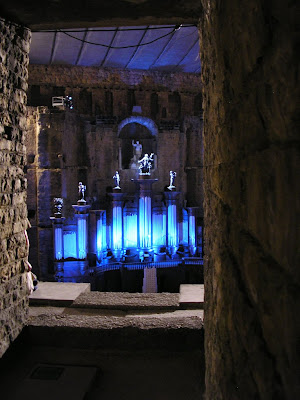August 5 performance review
Nicolas Joël’s staging


Obviously, Joël’s view on Faust is centered around Marguerite.
The huge set in the background – a replica of the organ in the Narbonne’s cathedral – was designed to emphasize the church scene at the end of Act 4 where Marguerite seeks refuge feeling guilty after her brother’s death, only to be “welcomed” by Méphistophélès – effectively rushing her to madness, ultimately leading her to kill her child and being imprisoned and executed.
The libretto is quite rushing these events by the way – no doubt a main flaw to fluidity in this piece. On this level, Joël didn’t really help understand the story better; the duel scene in which Valentin (Marguerite’s brother) is killed by Faust, with the help of Méphistophélès, was conceptualized as a kind of “struck by lightning” moment with Faust and Valentin both static, with no sword in hand, and Méphistophélès killing Valentin by a casual fan movement.
I liked the idea very much, but people not familiar with the piece were clueless as to what was happening (I should know, I know some of these people).
Anyway, the church scene – staged as it was to be the counterpoint of the evening – was clearly a success, and I must admit the whole organ setting was indeed well thought of (as I managed to convince the couple sitting next to me of its relevance – though they were more than skeptical about it).
The rest of the production, I must say, was a disappointment: very conventional, very static, very boring. The costumes were unimaginative as well – except for Méphistophélès who was dressed as a circus host – a costume that didn’t suit René Pape’s silhouette (or lack of, rather) at all.



I still remember the first time I saw Plasson conducting, a decade ago, when I was a student in Toulouse.
He was trying to bring classical music to young people by performing free concerts exclusively for students – and there’s nothing more appealing to a student than the word “free”. He was conducting Mahler and his interpretation was full of life, energy and passion.
Neither of those components was to be found in Orange. His conduction was painfully slow, blend and apathic (from what I heard his performances of Carmen in Orange were equally bad). Moreover, the rhythm was awfully off on the fast arias, and clearly “Gloire immortelle de nos aïeux” was a disaster. This was kind of my last try with Plasson, and I must say I’m done for good with him.
From now on, his presence will dissuade me from attending a performance.
Supporting roles
My beloved Nicolas Testé as Wagner made a terrible entrance. His first sentence was an absolute nightmare and in such a small part, the first notes are decisive. The role of Siebel – a male role with a soprano line – was filled by a tenor (contrary to tradition) and I must say this choice actually worked pretty well for me – plus Xavier Mas as Siebel made a good impression on me. Marie-Nicole Lemieux’s Marthe was fun and entertaining, which is basically what the part demands, more than technical perfection.
Jean-François Lapointe as Valentin was praised by a lot of the audience (beautiful timbre and good singing) yet I could not get pass
Ernest Blanc’s Valentin. At that point, I realize I probably never will and will remain unsatisfied by any performance. Inva Mula’s Marguerite was also a disappointment. The first part of the jewels aria, “Il était un roi de Thulé” was inaudible as it was obvious she was keeping her strength for the “Ah je ris de me voir si belle en ce miroir” part. The rest of her performance was OK I guess, but again, first impressions are unforgiving.
There is no doubt Pape has a great stage presence and is equally good in comic and dramatic situations. His high notes are splendid and incredibly convincing, but the lower lines –numerous in this part – are clearly his weakness. They all were perfectly hit on Thursday, but the volume level was too weak – even with the great acoustics of the Théâtre Antique. On the other hand, projection is not really an issue for Roberto Alagna. As expected, the live broadcast on France 2 brought out the best of him, vocally and most noticeably in the acting department. He’s not the fantastic Faust he used to be several years ago but his performance was superb – maybe some of the light vibratos on the high notes could have be prevented, but his stage presence was indeed one of the best I’ve seen of him since 3-4 years.
Conclusion
The review – as always with me – may be mixed – mitigé as we say in French – but there’s one thing unique in Orange – especially for someone like me living in the heart of a big city: attending an opera performance literally under the stars is a one-of-a-kind experience: the beauty of the music is an amazing complement to the wonders of the Universe.
 French légionnaires watching over the performance
French légionnaires watching over the performance















